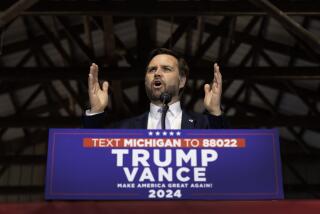Herschensohn and Zschau Show They’re Miles Apart
- Share via
RANCHO BERNARDO, Calif. — Rep. Ed Zschau and commentator Bruce Herschensohn stood miles apart at the same podium Monday and gave Republicans lively evidence that there is no common Republicanism among aspirants for the party’s nomination in the June 3 U.S. Senate primary.
Whether it was immigration, negotiation, defense, or just plain style, the two contenders showed just how different they can be and still be in contention for the GOP nomination.
The occasion was a meeting of a group called the Conservative Order of Good Guys at a country club here, about 20 miles north of San Diego. It was the first face-to-face debate between Herschensohn, regarded as the most unbending conservative in the race, and Zschau, its most pragmatic moderate.
Herschensohn, combative, challenging and his voice characteristically full of alarm, began by listing four contemporary “days of infamy” in U.S. history--the days when Congress voted for a nuclear arms freeze, to limit production of the MX missile, to restrict aid to rebels in Nicaragua and to impose economic sanctions on South Africa.
These were votes, Herschensohn said, that jeopardized the “preservation of the United States.” Democratic incumbent Sen. Alan Cranston, whom the Republican nominee will face in November, voted for all four measures. And so, added Herschensohn with a dramatic pause, did Zschau.
“How could you plan to run for office against Alan Cranston?” demanded Herschensohn.
His guiding principle in foreign affairs, Herschenshohn said, was first stated by former President John F. Kennedy: “Support any friend; oppose any foe.”
Zschau chose not to return the attacks so strongly. Instead, calmly and without Herschensohn’s tone of alarm, he emphasized his four years on the House Foreign Affairs Committee, describing the preservation of U.S. interests as more complex than four votes. The issues, he said, are broader than Herschensohn’s focus on anti-communism.
Zschau said he is guided by this philosophy in foreign affairs: “A resolve to be strong, a resolve to be firm while pursuing constructive negotiations.”
When he did attack, Zschau used a scalpel, not a broadsword. He quoted Herschensohn’s hero and supporter, former President Richard M. Nixon, on the need for moderation in foreign policy between the United States and the Soviet Union.
“It is irresponsible for the world’s two greatest military powers not to have maximum communication with each other and not to try to negotiate their disputes,” went the Nixon quotation.
A sampler of exchanges on other issues:
DEFENSE SPENDING. Zschau: “We should apply the same sharp pencil to defense expenditures that we do to other expenditures.”
Herschensohn: “If we spend too much on defense, we’re going to waste a lot of money. If we spend too little we’re going to waste that great experiment known as the United States.”
IMMIGRATION. Zschau advocated an enlarged Border Patrol but also sanctions on employers who hire illegal aliens and a limited process of amnesty for longtime aliens residing in the United States.
Herschensohn supported only a much-expanded Border Patrol. He added that he is “terribly concerned” about Arab terrorists slipping into the United States via Mexico and unleashing “a Pearl Harbor of terrorism.”
THE CAMPAIGN: Zschau said that with his moderate views, “I have the capacity to seize the center of the political spectrum and deny Cranston the support of Republicans and independents that have given him his margin of victory in the past.”
Herschensohn won the biggest round of applause of the day when he described himself as a no-nonsense straight-talker who didn’t clutter up television with fancy commercials like Zschau’s or Cranston’s, showing them walking in the woods or jogging.
“Those don’t mean anything. Those kind of spots underestimate the intellegence of the voter.”
Herschensohn also announced that he had received the late endorsement of rival candidate Bill Allen, a professor at Harvey Mudd College in Claremont, who has abandoned his own struggling campaign.
More to Read
Get the L.A. Times Politics newsletter
Deeply reported insights into legislation, politics and policy from Sacramento, Washington and beyond. In your inbox twice per week.
You may occasionally receive promotional content from the Los Angeles Times.










